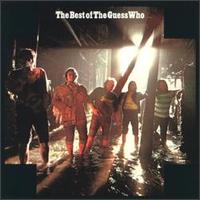Rating: 6
Squirm factor: 5
 There's a new biography of Randy Bachman (if you can believe that) that calls him and Burton Cummings "the Lennon & McCartney of Canada." I'm not sure about that claim (although I am sure that only in Canada could a guy named Burton be a rock star without taking a pseudonym) but the Guess Who's best work contains a blend of pop and rock elements much like the Beatles' did, but it also throws in some MOR and jazz elements that make it unique.
There's a new biography of Randy Bachman (if you can believe that) that calls him and Burton Cummings "the Lennon & McCartney of Canada." I'm not sure about that claim (although I am sure that only in Canada could a guy named Burton be a rock star without taking a pseudonym) but the Guess Who's best work contains a blend of pop and rock elements much like the Beatles' did, but it also throws in some MOR and jazz elements that make it unique.Side one of this compilation is dedicated to the hits of the group while Bachman was a member, and side two features other songs (not all of them hits) from after he left. It's clear that there was something special about the work Cummings and Bachman did together, because the Guess Who takes a sharp nosedive without Bachman, and we all know about BTO. Side one is incredible, definitely a nine-point album side. The songs are conventionally catchy, yet built with odd structures and odder modalities, yet they brim with energy and confidence. It's like Steely Dan played by a bar band!
Take "These Eyes" - starting off with an electric piano riff that turns out to be playing against the beat, then in glides that bass, working up and down the scale but never right on the tonic when the piano's there, and the double-tracked guitar fills in acoustic chords with a delicately timed electric "chick." And then it opens gently into the bridge by a change of accent in the piano. What an arrangement! And the lyrics are top-notch: how often do you get metonymy in a pop song? And let me say, Burton Cummings, for all his hippie affectations later, can deliver a ballad like this. He's smooth when he needs to be, impassioned in the chorus, but never screams or sounds shrill.
Other great numbers are "Undun", with an unusual samba beat joined to a jazzy major-seventh chord progression, and "Laughing" which starts with a boring guitar pattern but redeems itself with the melody and especially the drum work in the bridge. "No Sugar Tonight" is another fabulous bit of poetry - metaphor this time (more common but still a nice touch). The music is more conventional but no less catchy. It's too bad "American Woman" is remembered as their biggest hit. The guitar lick is nice enough, but Cummings really overdoes the Robert Plant imitation (as if that's somebody to imitate!) and the lead guitar slathered everywhere is uninteresting and mucks up the sound.
At the end of side one, though, you might just be thinking that biographer was on to something. Here's a handful of quality songs - each eminently coverable, appealing to all types of fans, yet musically innovative and lyrically profound. Just like all those Lennon/McCartney tunes. Side two, though, takes a dip into Wild Life/Some Time in New York territory.
Bachman was replaced by Kurt Winter, who writes half of side two. "Hand Me Down" world was a hit, and it's not too bad. The chorus is moderately catchy, 'til the shrill "I've got one already" melody kicks in, and the gibberish of the verse lyrics is redeemed by the funky rhythm. "Bus Rider", however, is atrocious. Blaring one-note melody, sung in straight harmonies to pound home its banality, and an absolutely idiotic lyric. Do they think none of their fans ride the bus? To whom is this song meant to appeal?
Cummings turns in "Share the Land", which is a terrific composition: the chorus is catchy but not trite, with its modulating tune over downwards-moving chords, and the three-part harmonies are a nice touch. I'm not sure why all those musicians around 1970 were convinced the revolution was at hand, though, nor why they thought that the proletariat was just clamoring to give rock stars the cream of their oppressors' reclaimed assets. Winter and Cummings collaborate on "Do You Miss Me Darling?" and "Hang on to Your Life." The first is pretty dull, with a slow tempo and a static tune. The latter is just bizarre. I remember hearing stories that after John Bonham died, Yes and Zeppelin were going to merge. If you've ever wondered what it would have sounded like, go no further. The chorus has all those weird Yes harmonies, and the main riff is tough and bluesy, and the whole thing ends with a Psalm reading. The parts don't really jell, and it's a tough four minutes to sit through.
The story of the Guess Who is a crying shame. Bachman and Cummings, working together, produced some amazing music, but apart they were each distinctly less than half of their former sum.